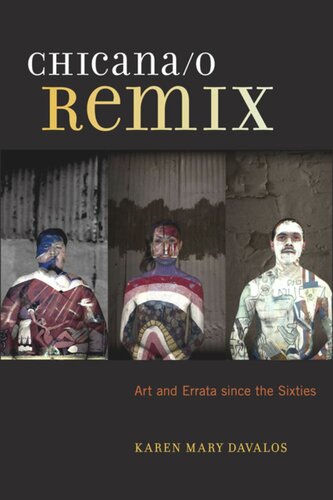

Most ebook files are in PDF format, so you can easily read them using various software such as Foxit Reader or directly on the Google Chrome browser.
Some ebook files are released by publishers in other formats such as .awz, .mobi, .epub, .fb2, etc. You may need to install specific software to read these formats on mobile/PC, such as Calibre.
Please read the tutorial at this link: https://ebookbell.com/faq
We offer FREE conversion to the popular formats you request; however, this may take some time. Therefore, right after payment, please email us, and we will try to provide the service as quickly as possible.
For some exceptional file formats or broken links (if any), please refrain from opening any disputes. Instead, email us first, and we will try to assist within a maximum of 6 hours.
EbookBell Team

0.0
0 reviewsRewrites our understanding of the last 50 years of Chicana/o cultural production.
Chicana/o Remix casts new light not only on artists—such as Sandra de la Loza, Judy Baca, and David Botello, among others—but on the exhibitions that feature their work, and the collectors, curators, critics, and advocates who engage it.
Combining feminist theory, critical ethnic studies, art historical analysis, and extensive archival and field research, Karen Mary Davalos argues that narrow notions of identity, politics, and aesthetics limit our ability to understand the full capacities of Chicana/o art. She employs fresh vernacular concepts such as the “errata exhibit,” or the staging of exhibits that critically question mainstream art museums, and the “remix,” or the act of bringing new narratives and forgotten histories from the background and into the foreground. These concepts, which emerge out of art practice itself, drive her analysis and reinforce the rejection of familiar narratives that evaluate Chicana/o art in simplistic, traditional terms, such as political versus commercial, or realist versus conceptual.
Throughout Chicana/o Remix, Davalos explores undocumented or previously ignored information about artists, their cultural production, and the exhibitions and collections that feature their work. Each chapter exposes and challenges conventions in art history and Chicana/o studies, documenting how Chicana artists were the first to critically challenge exhibitions of Chicana/o art, tracing the origins of the first Chicano arts organizations, and highlighting the influence of Europe and Asia on Chicana/o artists who traveled abroad. As a leading scholar in the study of Chicana/o artists, art spaces, and exhibition practices, Davalos presents her most ambitious project to date in this re-examination of fifty years of Chicana/o art production.